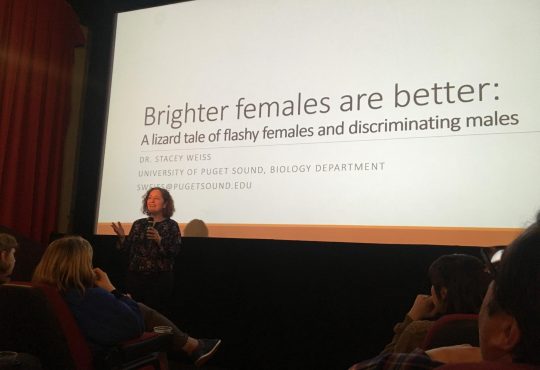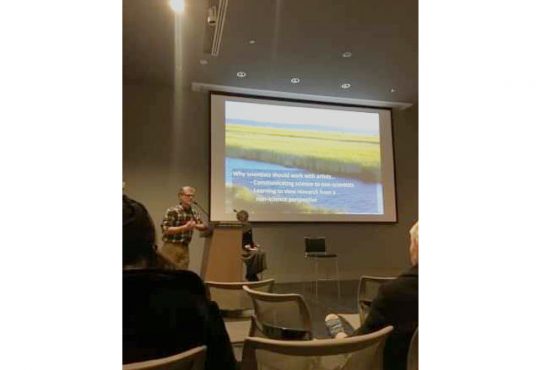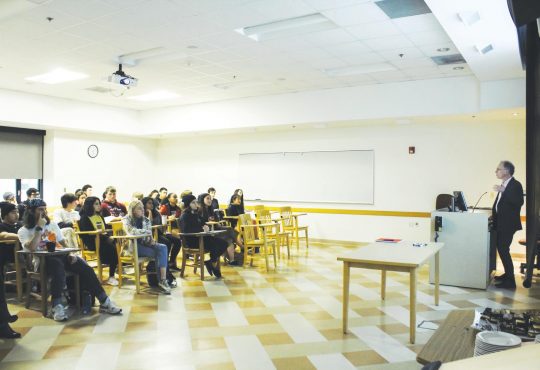
Spring semester has proven to be an eventful time of the year, especially for those in the Honors Program presenting their senior theses. In the past two weeks there have been many presentations, touching upon topics such as “Algae as a Human Food,” “Springtime Rapture: A Dramaturg and Actor’s Exploration of ‘The Lady’s Not For Burning’” and “I see Genocide: Native and Non-Native Usage of Alternative Pathways to Battle Pollution in Ponca City, OK.”
For many of these presentations, planning spanned all the way back to junior year. According to the Honors Program webpage, students are encouraged to speak with faculty members, study abroad, reach out to the University Enrichment Committee (UEC) as well as apply for research scholarships such as the Thomas A. Davis Research Committee during their junior year — all in preparation for the moment they can put on display what they have spent so many months researching.
As stated on the Honors Program website, once students submit an outline of their research project and get it approved by the Honors director, they are encouraged to utilize all resources they have available to advance their research. This includes reaching out to faculty members, engaging with relevant course materials, past or present, and keeping in touch with their committee, a group of faculty members who read the ongoing thesis paper. Throughout the production of the thesis, the student is required to be proactive and disciplined.
Henry Gardella, a senior honors student who gave his thesis on “The Alliance of Youtube and Patreon,” discussed the value of such an intense process. “I … valued the chance to pursue something entirely my own. Not only did I enjoy pursuing topics I was interested in,” he said, “I also learned that I could contribute original and potentially valuable knowledge.”
Gardella’s presentation discussed topics such as crowdfunding, specifically the correlation between the amount of subscribers and views on Youtube with the amount of donations a creator receives on Patreon, an organization that allows content creators to receive donations or payments from supporters.
Much of Gardella’s research required manual data collecting. “As it turned out, collecting the data and writing the paper wasn’t as hard as I thought it would be. The real challenge was humbling myself to the point where I would settle for a small data set and a less-than-perfect paper. It’s better to do something small than nothing at all,” he said.
At the event, Gardella’s thesis advisor was present in addition to other faculty members associated with the Honors Program. They were asked to fill out evaluations based on the presentation. The student was assessed based on criteria such as clarity of presentation and use of materials. Afterwards, audience members were encouraged to ask questions and engage the student in further discussions.
“I am enormously grateful to my thesis advisor, the other faculty who helped me along the way and of course my friends and family who listened to me talk at great length about a niche topic,” Gardell said. “All of these people have encouraged me to pursue my ideas, and it is extraordinarily gratifying to hear that my voice as a scholar matters. I hope to encourage my friends in their research the way they encouraged me.”
Some of the other talks that were presented in the last few weeks include: “Transgressive Toys: A Semantic Analysis of ἄθυρμα in Archaic and Classical Greek” by Annie Lamar, “The Impact of Transboundary Water Management on Human Security in Low-Income States” by Meadow Poplawsky and “Chinese Radicals and Recurrent Neural Networks: An Inquiry into the Nuances of Human and Machine Language Translation of Mandarin Chinese to English” by Eric Zeitz.
For more information about upcoming Honors senior thesis presentations, visit the Events Calendar page of the University of Puget Sound’s website at pugetsound.edu/news-and-events/events-calendar/upcoming



